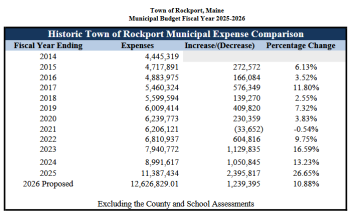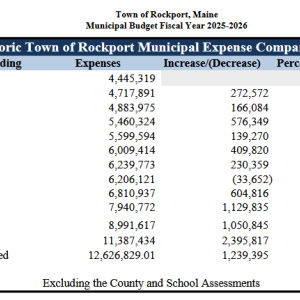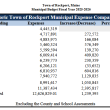Rockport’s budget process needs an overhaul
This week, Rockport residents received the newest edition of the town’s Rockport Resource newsletter, which always provides a helpful indication of what the Rockport Select Board wants the town’s voters to do. If the Board wants voters to adopt a series of restrictions on short-term rentals, for example, we’re treated to pages of arguments making that case. If the Board would like to spend millions on a new wastewater system, we’re encouraged, in the pages of this taxpayer-funded newsletter, to support the Board’s position on that issue.
What the Board makes clear in this newest edition of the Resource is that it would very much like voters to approve the proposed town budget when they go to the polls next week.
What you will discover, though, if you look closely, is that the municipal budget alone (not including assessments for schools or the county), is up 13.68 percent. The figure is driven by a proposed expenditure increase of 10.9 percent, which comes on the heels of a spending increase this past year of 26.6 percent, which in turn followed a spending hike of 13.2 percent. Throw in an increase of 16.6 percent the year before that, and you have an average annual spending growth over the past four years of 16.8 percent.
Let me say that again. Rockport’s municipal spending has gone up by an average of 16.8 percent every year. For four years.
What does that mean in dollar terms? Way back in Fiscal Year 2022, the Town’s spending—again, not including the schools or the county assessment—was $6.8 million. The spending proposal to go before voters next week? $12.6 million.
Rockport has nearly doubled its municipal spending in just four short years.
If that seems like a dramatic departure from the recent past, it is. In the decade that preceded these recent increases, from FY2013 to FY2021, Rockport’s municipal spending went up at an average annual rate of 5 percent. In FY 2016, for example, town spending went up by $166,084. Last year it went up by more than two million dollars. In a single year.
Yes, you are saying, but according to the Rockport Resource, the budget committee (of which I am a member) proposed “no recommended changes to the budget that they presented to the Select Board.” So, what gives?
A bit of background on the town’s budget development process might be helpful in understanding this.
For members of the Budget Committee, the “substantial review” that the Resource claims took place consisted of a series of four meetings, held jointly with the Select Board and chaired by the Select Board chair (the Select Board makes sure the Budget Committee is never left unattended). These meetings come at the end of a months-long budget development process led by the town manager. Through the herculean effort of the town’s finance director, Megan Brackett, an encyclopedic budget document was assembled, totaling more than 500 pages, and it is over the course of these four meetings that the two committees reviewed the proposed budget by essentially going through this massive document a page at a time.
For newcomers to the process, like me, the flaws of this approach became apparent instantly. From the very start, Budget Committee members are essentially drawn into a line-by-line analysis of the budget, and as a result, end up getting bogged down in discussions about $600 here and $2,220 there. It’s all trees, no forest.
Meanwhile, the town’s spending on health insurance for its employees has grown from $661,000 in FY 2023 to a staggering $1.4 million in the proposed budget. This, though, was never discussed. Indeed, the Budget Committee was actively discouraged from discussing employee pay and benefits, even though that spending consumes half the budget. We were told that it was too late in the process, that these costs are essentially on autopilot anyway, and that discussions of this kind would unduly worry the town’s employees.
So, we instead spent half an hour talking about why it costs $120,000 to mow the cemeteries. This is not a bad question to answer, mind you, as that seems like a ludicrous amount of money, but in the context of a $12 million budget that is now growing by over $1 million every year, maybe that topic was not worth the time we spent on it.
In short, what was missing in all this was any sense of the big picture, any deep analysis of the big cost drivers. Questions about regionalization initiatives that might contain costs went nowhere, and there seemed little interest in focusing in on the handful of issues driving most of this budget growth. The goal of these meetings, it appeared, was to just get through the meetings so we could say we had held the meetings.
And so, in the end, the Budget Committee had no recommendations to make. How could we? Pressured by looming deadlines, mired in a massive budget document, and discouraged from asking tough questions, the Committee reluctantly signed off on it.
Importantly, the Committee’s disinclination to propose changes to the budget does not, as the Resource would suggest, imply the group’s support for the resulting budget (the Resource, by the way, is an $8,000 budget item, not counting the staff time consumed in its creation.) You will look in vain for an up-or-down vote by Budget Committee members, because a couple of years ago, the Select Board determined that the longstanding (and widely practiced) tradition of having Budget Committee recommendations appearing on the ballot was suddenly a problem and got rid of it through an amendment to the Town Charter.
I’m not sure how providing voters with less information about the budget is helpful, but that is what the Select Board determined.
For the record, I, for one, don’t support the budget and will vote against it, but this is nothing new. I habitually vote “no” on the Town’s budget because I don’t see how my kids will ever be able to afford to live here if we keep this up. Nevertheless, I am hopeful that perhaps with some revisions to the budget process, we can begin to “bend the curve” on these massive spending increases going forward.
Indeed, I should acknowledge that there were positive signs, despite the frustrations along the way. There was, I think, a broad consensus that this process, despite the hard work by the town manager, the finance director, and others, isn’t working in the way we need. There were some positive, forward-looking discussions among Budget Committee members, and the Committee itself is ably led. The Town also has the good fortune of employing some truly outstanding people. Spending time with them and better understanding their own needs and frustrations was the best part of the experience by far. Their knowledge, and the knowledge and experiences of Rockport residents more broadly, will be critical to addressing this crisis.
And it is a crisis. We must confront the fact that this level of spending growth is unsustainable and is rapidly turning Rockport into a town that only few can afford. The annual report from Camden Rockport schools, which we also received in the mail not too long ago, tells the story. School enrollment, particularly in the early grades, is in steep decline, driven, one has to think, by the lack of affordable housing for young families. Something has to give here, and soon.
So please get out a vote next week but do so with the understanding that big challenges are upon us and big changes will need to be made.
Stephen Bowen lives in Rockport




























